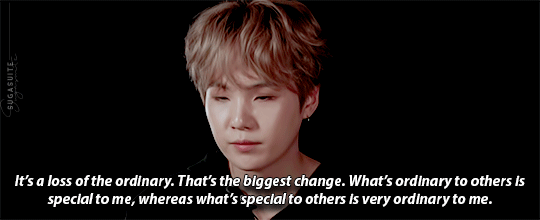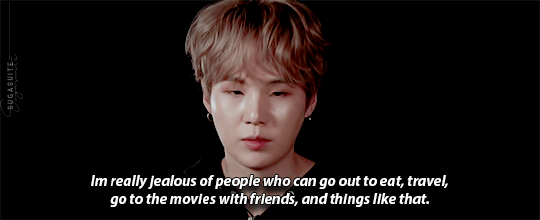
If you haven’t already, I highly recommend reading my analysis of “Agust D” (the first mixtape) before moving forward, so you can understand all the references in Agust D’s “D-2” mixtape.
Songs in “Agust D” (the first mixtape) hit hard. They’re raw, sometimes aggressive, and reflect the chaotic intensity of being an angsty youngster in pain. The verses feel thrown at you, like Yoongi is purging all poison from within. This clearly reflects in how different “D-2” (the second mixtape) sounds.
Songs in Agust D’s “D-2” mixtape are mellow-er, showing more maturity. He’s still furious and struggling but expresses it with more composure and a sense of resigned acceptance.
As he said in a Billboard interview:
I was a bit intense back in 2016 [when the first mixtape was released]. Everything was at full force, full strength. I actually listened to my previous mixtape again while working on the new one, and if I were asked to do it again, I can say I wouldn’t be able to.

The “D-2″ mixtape also feels more experimental as he’s working across genres. We have an absolute bop (Daechwita), a ballad (Dear My Friend), a political/social criticism rap (Strange), a hype song (Burn it), and a thought-provoking K-pop track (People).
He’s also singing now, instead of just rapping like in the earlier “Agust D” mixtape.
Themes
Change
All the changes aren’t coincidental. Most of the songs in Agust D’s “D-2” mixtape deal with what has changed, what should change, what he wishes he could change, and how things change.
Take, for example, the lyrics in the first track, Moonlight:

- Sometimes I ask myself again, ‘if it’s possible to go back, will you go back?’
- [Although things have changed since I started 10 years ago], my head is still a mess.
- A lot has changed in my life but the moonlight that shines on me is still the same.
- Change is inevitable, but it’s how we change that matters.
Daechwita, one of the most popular songs in Agust D’s “D-2” mixtape, talks about how his life has changed (rags to riches) and what he wants to change now (being more grounded).

Here are some of the lines:
- Born a slave, risen to a king.
- I trap the past in a rice chest.
- The clothes I wanted, then money, and then goal, and then what should come next? I suddenly realize where I am, I have nothing above me.
- I, who has only been looking up, now would like to just look down and put my feet on the ground.
Strange, the fourth track, talks about what needs to change in society. There’s also an undercurrent of “Can you actually change things? Or are you too bound by the system?”
As the lyrics say:
- Everyone is a slave of this system.
- Life goes on, somehow, just like this.
The song also talks about how polarizing ideas are just a few syllables apart.
- The one who wants peace, the one who wants a fight, the word games that change easily like flipping palms.
The song 28, is literally about growing up and changing:

- I grow older, I’m gradually becoming an adult.
- I thought I’d change when I turned twenty, when I graduated, when I become thirty…so what changed with me?
- I can’t remember, what are the things that I hoped for?
In Burn It, he contemplates what has changed within him and talks about wanting to burn everything to see what remains in the end. As the lyrics say:
- After having a taste of success, how am I different from the me of back then?
- You of the past, you of the present, light the fire.

In People, he talks about how people change, how they live, love, and are eventually forgotten. Some lyrics:
- People change — like I have.
- There’s nothing that lasts forever.
- Flow along the way the water flows.
- Humans are animals of regret.
In Honsool, he talks about i) the lack of change in his life and ii) how his reality is different from his ideals.

- Today as well, I finish the work for the day and come home right away [it’s the same day every day].
- Tomorrow will come and go again. I, who’s like this, and you, who’s like that, we just endure through the day.
- The ideal is slapping the reality in the back of its head.
Dear My Friend, the last track on the “D-2” mixtape is about regrets and wondering if things could have been different if he made different choices in the past.
The song also continues the theme of change by addressing how people change in relationships to the point where they become unrecognizable.

Some lines from the song:
- If I had held you back then, if I had stopped you back then, would we have still remained friends?
- Would it be that you’ve changed, or I’ve changed?
- When I saw you for the first time in a while, you had become a completely different person.
- There’s no you that I used to know, there’s no me who used to know you.
Contrast
Another recurring theme in the mixtape is contrasts. In an official interview with the company, he said, “I always like my music to make a contrast. I wanted to show the beauty in contrast.”
That’s why most songs in the “D-2” mixtape deal with contrasts.
The most noticeable visual contrasts are in Daechwita: the king vs commoner, traditional buildings vs modern cars, and swords vs guns. Even his attire has a contrast with traditional clothes and modern shoes.

Lyrically, the song talks about rags vs riches, being on the top vs wanting to stay humble and grounded, king vs slave, dog vs tiger, etc.
In Moonlight, he compares his small beginning (making music in a basement in a small town) to his current success (now living in one of the most affluent areas in Korea).
Then, he says, sometimes he feels like he’s earned his success too easily, but in other moments, he feels it’s compensation for his hard work. The chorus itself is a contrast highlighting how everything has changed except his (messy) head/the moonlight (shining on him as he stays up working on music).

Another line says: “Sometimes I feel like I’m a genius. Sometimes I feel like I have no talent.” The next line says, sometimes songs write themselves easily while sometimes he feels creatively blocked.
As a celebrity, thousands of articles talk about his life, asking what do you think about Yoongi doing this, what do you think about his new project, and so on. In What Do You Think? he contrasts this magnified focus on him by saying he does not care at all what anyone thinks of him.
He also talks about going so high that people can’t see him. This has two contrasts:
- If you’re super popular and successful, people are more likely to see you.
- The higher you go, the more you can see the world but the world can’t see you.
Some other lines also offer a straight-up contrast:
- Thinking that my success has anything to do with your failure.
- There’s no going back, I go straight.
Strange, his song with fellow BTS member RM, is full of contrasts too:
The song talks about polarization, the difference between truth and lies, and the widening gap between the rich and the poor. Almost every line has a contrast:

- God, is life suffering or happiness?
- The world is black and white.
- It’s been a long while since truth got eaten away by lies.
- Who would it be that benefits the most? Who would it be that gets harmed the most?
- The one who isn’t sick in the world that is sick…The one who has his eyes open in the world that has its eyes closed…
- The one who wants peace, the one who wants a fight.
- They say ‘have a dream’ when no one has a dream.
- We’re given multiple choices but our taste is controlled by the capital.
- However much money one has, everyone is a slave of this system.
- A round nail that’s been hammered into a square hole.
- There’s no correct answer, that’s the answer.
In 28, he talks about growing up and learning more about the world while wishing he didn’t. He also contrasts the bustling city lights he watches from the quiet darkness of his room.

In Burn It, he talks about wanting to burn the past feelings and the self, but he calls on both his past and present self to light the fire. Then, he says he doesn’t know if he will become the blazing sun or the ashes left behind. He also equates giving up to a courageous decision.
In People, he grapples with the question of whether he’s a good or a bad person. He also explores the difference between an ordinary and extraordinary life.
This is based on one of his earlier quotes from Break the Silence: “What’s ordinary to others is special to me, whereas what’s special to others is very ordinary to me.”


Another line from the song: “When it’s not there, you wish it is, when it’s there, you wish it’s not.”
In Honsool, he talks about “detoxifying” himself with alcohol (alcohol is actually a toxic substance). Usually, people remember their day clearly while forgetting any events after they’re drunk, but here he says his days are blurry while drinking alcohol is an important, end-of-the-day ritual. He also talks about how he thought he would party every day after becoming a star, but in reality, he just drinks alone in his room.

In the Interlude, he says: “One day, I crawl on the floor. On another day, I fly high in the sky.”
The final track in the “D-2” mixtape, Dear My Friend also shows a strong contrast in the way Agust D feels about his old friend. He says he hates him, but also says he misses him. Other lyrical contrasts in the song include big dreams vs young age and short phone call vs long distance.

You can witness Agust D’s (or rather Min Yoongi’s) growth as an artist and as a person with every solo project so it’s only fitting his songs revolve around exploring, questioning, and embracing the changes.
And while he dives deeper into himself and grapples with the big questions, he invites you to go on a similar journey within yourself and find your own answers.
As he says in an interview with TIME magazine:
“I just throw the question mark; it’s up to each individual to decide [how to answer].”
If you’ve made it this far and enjoyed my work, consider supporting me to make more of it! It helps keep the creative cycle going.
You come across something that touches you and changes your life, so you create beautiful art reflecting that. It inspires someone else and the cycle of creativity continues. Be a part of it!
Leave a Reply